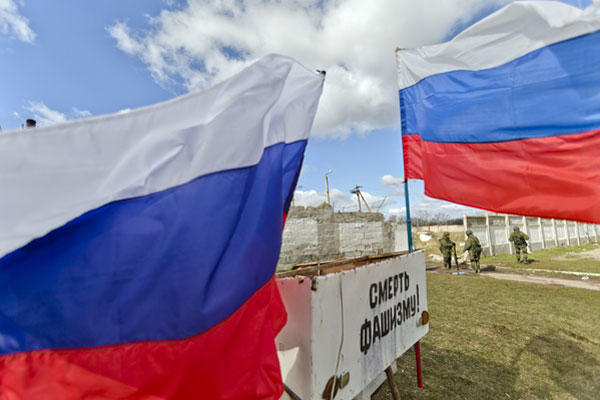Russia maintains about 250-300 troops in eastern Ukraine to train, advise and equip rebel forces who guarded elections over the weekend to solidify their separation from the central government in Kiev, Air Force Gen. Philip Breedlove said Monday.
Russia also moved mechanized units closer to the border over the weekend to "make sure that the elections went according to the separatist plans," Breedlove, the commander of NATO and the U.S. European Command, said at a Pentagon news conference.
Breedlove disputed published reports that Russian President Vladimir Putin had inserted as many as 4,000 troops into eastern Ukraine as part of his "hybrid warfare" campaign to carve out a second Russian-speaking enclave from Ukraine following the takeover in Crimea.
"There's nothing like that number in eastern Ukraine," Breedlove said of the Russian troop presence. The Russians were also maintaining seven battalion-sized units on the border and were also running regular supply and arms convoys into eastern Ukraine to bolster the self-proclaimed "People's Republics" in the Donetsk and Luhansk regions of eastern Ukraine, Breedlove said.
"Russian equipment, re-supply, (and) training flows back and forth freely across that interborder space," Breedlove said.
Russia's Ria Novosti news agency said that Alexander Zakharchenko, a 38-year-old militia leader, won more than 80 percent of the vote for prime minister in Donetsk. Igor Plotnitsky, a 50-year-old Soviet Army veteran, was declared the winner in Luhansk.
The U.S. and the NATO allies said the elections would not be recognized and denounced them as part of Putin's plan to create a "Novorossiya (New Russia)" from the former Soviet republics. "We don't recognize them. We didn't support them. We don't think that they are helpful," Breedlove said.
"Ukraine and the entire civilized world will not accept this farce," Ukrainian President Petro Poroshenko wrote on Twitter on Sunday, and United Nations Secretary General Ban Ki-moon said the voting in eastern Ukraine was "a breach of the constitution and national law" of Ukraine.
The Russian Foreign Ministry said in a statement on its website: "We respect the expression of the will of southeastern regions' citizens," and called for a "stable dialogue" with the Kiev government.
European Union Foreign Policy Chief Federica Mogherini called the elections "illegal and illegitimate" and an "obstacle to peace" in eastern Ukraine, where more than 4,000 combatants and civilians have been killed in fighting between the central government forces and the separatists since April, according to the UN.
Breedlove suggested that the recent uptick in Russian Tu-95 Bear bomber flights over the North Sea and as far south as Portugal were meant as messages to NATO not to interfere in the eastern Ukraine elections.
"What is significant is that across history, most of these (air) incursions have been very small groups of airplanes, sometimes singletons or at most, two aircraft," Breedlove said. "What you saw this past week was a larger, more complex formation of aircraft carrying out a little deeper -- and I would say a little bit more provocative -- flight path."
"They are messaging us that they are a great power and have the ability to exert influence," Breedlove said of the Russian overflights.
Ukraine's security service said that a criminal investigation had been opened into the elections in eastern Ukraine. "The criminal investigation is not a political gesture," said Andriy Lysenko, a spokesman for the Ukrainian military.
Lysenko said that the separatist region "that remains temporarily occupied will eventually be liberated and those who took part in organizing the illegal elections will be held accountable according to Ukrainian law."
Breedlove repeated his view that NATO was now at a "strategic inflection point" as a result of Russia's aggression in eastern Ukraine and Crimea. Europe was now "far from being whole, free and at peace" as envisioned at the end of the Cold War, Breedlove said.
To counter Russia, the allies were "making some changes to how and where we have NATO forces," Breedlove said. He noted the training and joint exercises on a rotational bases conducted in the Baltic states and Poland, first by troops from the 173rd Airborne Division out of Vicenza, Italy, and now by the 1st First Cavalry Division out of Fort Hood, Texas.
"We require additional rotational presence" in eastern Europe "until we see the current situation begin to normalize," Breedlove said.
Currently, the Army has about 31,000 troops in Europe and Breedlove said his "main budget concern was that we take no further troop reductions" in Europe under the constraints of the Budget Control Act and the sequester process.
"We have it about right now," Breedlove said of the U.S. troop strength in Europe.
-- Richard Sisk can be reached at richard.sisk@monster.com




























